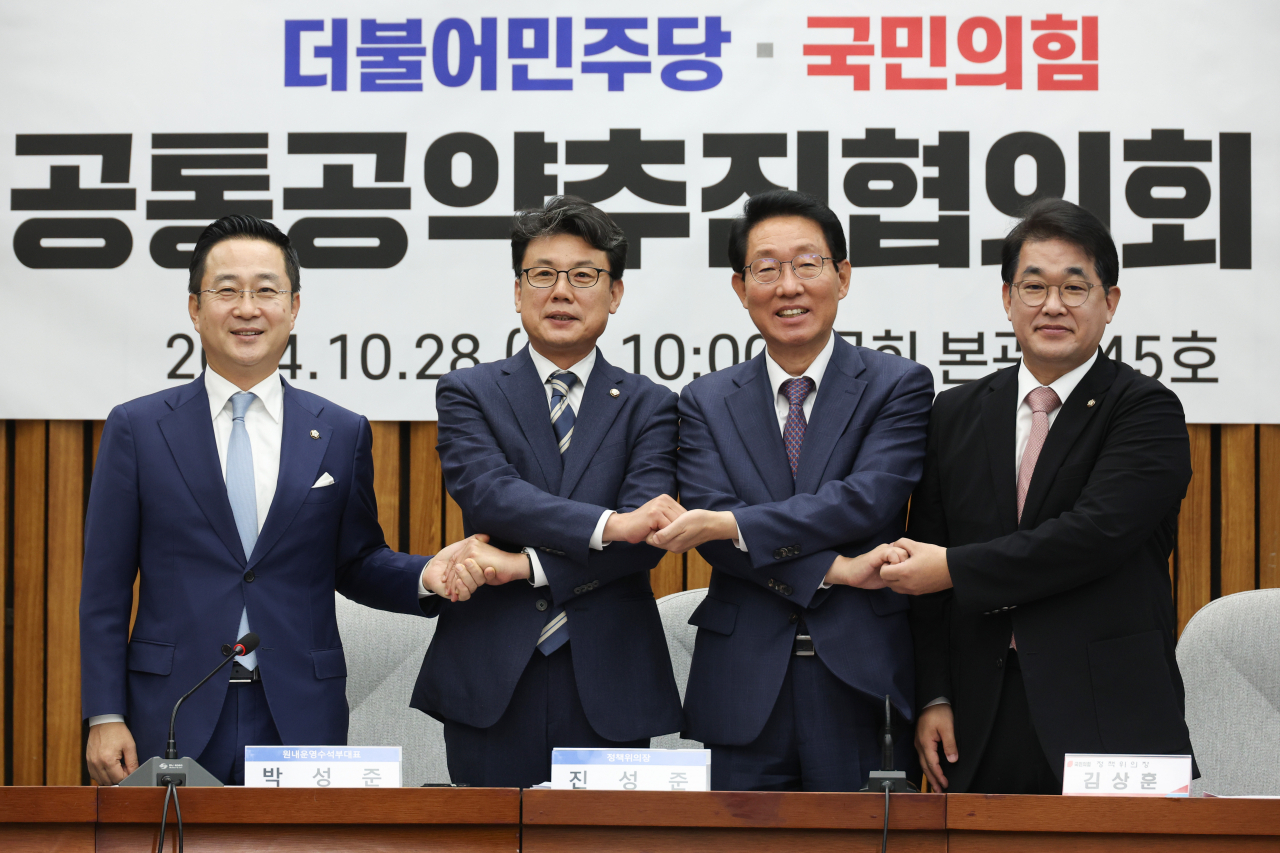
 |
| (Yonhap) |
The ruling People Power Party and the main opposition Democratic Party of Korea on Monday officially launched a joint consultative body for livelihood issues amid persistent tensions over various controversies surrounding the first lady.
The establishment of the joint consultative body aimed at carrying out common policy pledges comes nearly two months after an agreement was made between leaders of the two rival parties early last month during their first official talks.
The consultative body will consist of four members -- policy committee chairs and chief deputy floor leaders of each party -- and plans to review policy pledges tied to livelihood issues, including equal employment opportunities, abolishment of the financial investment income tax scheme, support measures for artificial intelligence technology and the low birth rate.
People Power Party Policy Committee Chair Kim Sang-hoon, a member of the new consultative body, expressed anticipation that the latest cooperation will bridge the gaps between the rival parties’ views on policies and legislation.
“While the ruling and the main opposition parties have to fight when we have to, we have to commit to our roles (as lawmakers) when dealing with bills related to people’s livelihood issues,” Kim said at an event marking the launch of the new body held at the National Assembly in western Seoul that morning.
“There could be some disagreements over (certain) bills, but I expect (such gaps in views) to be smoothly bridged,” he added.
Kim also pointed to issues such as the government’s pension reform plan and introducing a bipartisan resolution condemning Russia’s reported recruitment of North Korean troops in Russia's southwestern region of Kursk, where a major Ukrainian incursion took place in August.
Kim’s counterpart, Democratic Party Rep. Jin Sung-joon pledged to make full-fledged efforts to pass as many livelihood-related bills as possible regardless of the existing tension between the rival parties.
“While there will be several issues that the ruling and the main opposition parties are bound to clash over, we will do our best to deal with livelihood-related pledges and policies regardless of the current political climate,” he said, echoing Kim’s sentiment.
The parties said that the members discussed how to navigate the body in the first meeting held Monday.
President Yoon Suk Yeol meanwhile ordered the presidential office and the Cabinet to “pick up the pace” on reforming four key areas: national pension, health care, education and labor.
“The reform plan of the four key areas can be translated directly into (the improvement of) people’s livelihoods,” Yoon said in a meeting of senior secretaries, according to presidential spokesperson Jeong Hye-jeon in a written briefing. Yoon also highlighted the urgency of the matter and called for the officials to produce a “solid outcome” by the end of the year.
Monday’s launch of the bipartisan panel comes amid heightened tensions between the rival parties with the Democratic Party having railroaded multiple contentious bills, including the one that mandates a special counsel investigation into several allegations surrounding first lady Kim Keon Hee. The bills, which were mostly put to a vote and passed by the opposition-led Assembly were scrapped in revotes after Yoon exercised his veto power.
In a rare bipartisan move, the National Assembly in August passed some 30 bills aimed at improving the people’s livelihoods, marking the first time the rival parties showed such bipartisan support in advancing legislation since the 22nd Assembly started its four-year session in late May.
Among the 28 was the Nursing Act, which specifies the roles and responsibilities, while providing better legal protection, for nurses and nursing assistants across the country.
Despite the moves of rare bipartisan cooperation, critics have pointed out that overall, the Assembly has failed to pass several key bills needed to boost the economy due to the rival parties’ bickering over the controversies surrounding the first lady. The allegations against the first lady include her acceptance of luxury gifts, involvement in stock manipulation in the early 2010s and inappropriate interference in the ruling party’s candidate nomination process ahead of the April 10 general election.
People Power Party Chair Han Dong-hoon and Democratic Party Rep. Lee Jae-myung recently agreed to hold a second round of talks, following up on their first official meeting in early September. The date for the second meeting, however, is yet to be announced.









